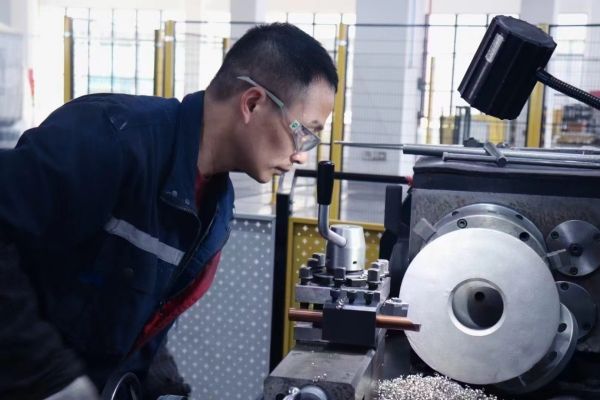Tech Theory: Technical…Practical… Interesting Automation Industrial Solutions

At DELCO, we understand the importance of customer satisfaction and strive to meet the unique needs of every client. As a reliable valve supplier, we are committed to providing excellent customer service and high-quality products to ensure optimal performance and longevity. By choosing DELCO as your trusted control air supplier, you can benefit from customized valve assemblies designed specifically to meet your requirements, enhancing efficiency and reducing downtime.
How to choose the pneumatic control valve for air opening and air closing?
The selection of air opening and air closing for pneumatic control valves is not simply a matter of design and selection in the field of self-control. It involves coordination between two professions, namely process and self-control. More precisely, it should be determined by the process profession. Experienced process designers can almost open their mouths when determining air closing and air opening. To describe air opening and air closing in a simple, vivid, and popular sentence is: “When air comes, it opens (if there is no air source, it closes), which is the air opening valve; when air comes, it closes (if there is no air source, it opens), which is the air closing valve,
No gas source can be understood as an accident state or a shutdown maintenance state. Generally speaking, the selection of gas on and off is more from the perspective of process operation “safety”. This “safety” is very important and should be considered comprehensively from the aspects of process, equipment, and operation. In the event of an accident, it can meet the safety needs of production, equipment, and personnel. Secondly, it should be considered from the requirements of process production, although there are also special circumstances.
Give a few examples:
1. For example, a steam heater (such as a precision tower kettle reboiler) uses water vapor as its heating medium. Generally, in the event of abnormal operation, such as high tower pressure or kettle temperature, the regulating valve should be closed in case of an accident or abnormal operation. For example, if the instrument air source suddenly runs out, the compressor is in an accident, or the pressure of the instrument air buffer tank is abnormal, being in a closed state is beneficial for cutting off high-temperature water vapor from continuing to enter the heater, which means cutting off the heat source and ensuring the safety of the equipment. “If there is no air source, it should be closed”. Obviously, this regulating valve should be opened for gas.
Expanding my thinking, should the cooling water inlet control valve of the condenser at the top of the tower be gas on or off? In order to ensure that the condenser is not under high temperature, or in the event of a loss of gas source in the regulating valve, and to maintain normal pressure and temperature at the top of the tower, it is not allowed for the cooling water to stop flowing. Therefore, in the event of an accident, the regulating valve should be in the open state, which is exactly the opposite of the regulating valve of the heater. The same principle applies to maintaining the normal and stable operation of the precision tower. In the event of an accident, there will be no adverse effects. For safety reasons, this valve “opens when there is no gas source”. Obviously, this regulating valve should be selected as the gas shut-off valve (which can only be closed when gas arrives)
In special circumstances, the steam regulating valve of the heater may also be selected for gas shut-off. For example, the material in the tower kettle is prone to crystallization at low temperatures. Once the addition of steam is stopped, the material will crystallize as the temperature decreases. In order to prevent it from blocking pipelines and equipment and to give people time to deal with accidents, it is necessary to maintain the steam flow and ensure that the equipment pipelines are not blocked. At this time, the gas shut-off valve should be selected. This is a special case and depends on the specific process operation.
2. Let’s take a look at the bypass flow control valve at the outlet of the vortex pump. Generally speaking, regulating the flow through the bypass is a common method. Although some electrical energy is lost, this regulation method is still quite common for small flow, high head pumps like vortex pumps. How to choose the air opening and air closing of this valve? Friends who are familiar with pump selection know that it is not allowed for the outlet valve of a vortex pump to be completely closed. Once the outlet valve of the pump is closed during operation, the vortex pump will be quickly damaged. Generally, the outlet of the pump has a check valve and a shut-off valve, and this bypass regulating valve adjusts the flow rate. Once there is an unexpected situation where the valve core of the pump outlet shut-off valve gets stuck, in order to ensure that the pump outlet is not completely closed, this bypass regulating valve must be in the open state. For example, if the air source is lost and this regulating valve is in the closed state, the opening of the shut-off valve at the pump outlet will not change compared to normal operation, which will inevitably cause a sharp increase in the outlet pressure of the vortex pump and be extremely unfavorable to the pump. So, for the safety of the vortex pump, this valve will open if there is no air source. Obviously, This regulating valve should be a gas shut-off valve.
In a word, the selection of gas on and gas off should be analyzed on a case by case basis to grasp the main aspects of the contradiction, such as the crystallization of tower kettle materials mentioned above. At this time, crystallization is the main factor of the contradiction. This type selection should not be the final say by the professional designers of automatic control. The experienced automatic control designers will actively ask the process workers about the operating conditions and processes, that is, how you operate, what are the taboos and precautions in case of accidents.
How to get a quick quote for industrial valves?
If you have questions about valves or want to get a quote, please feel free to contact us, we will reply within 6 hours. Phone +86 159 8960 2972, WhatsApp +86 159 8960 2972 or email marketing [email protected].
DELCO’s quality, competitive prices and excellent service make it the best valve partner to help you grow your business. Customize your valves, we have no minimum order.
At DELCO, we understand the importance of customer satisfaction and strive to meet the unique needs of every client. As a reliable control valve supplier, we are committed to providing excellent customer service and high-quality products to ensure optimal performance and longevity. By choosing DELCO as your trusted control valve supplier, you can benefit from customized valve assemblies designed specifically to meet your requirements, enhancing efficiency and reducing downtime.
Furthermore, our competitive pricing on electronic pressure regulators enables you to offer top-notch solutions. As one of the leading control valve manufacturers, we take pride in delivering reliable valves that not only meet industry standards but also contribute to the overall profitability of your business. By partnering with DELCO, you can have peace of mind knowing that you are making a wise choice for the long-term success of your company.



